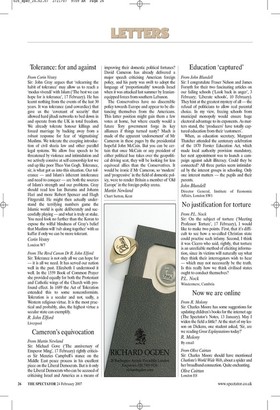Tolerance: for and against
From Corin Vestey Sir: John Gray argues that 'relearning the habit of tolerance' may allow us to reach a 'modus vivendi' with Islam (The best we can hope for is tolerance', 17 February). He has learnt nothing from the events of the last 30 years. It was tolerance (and cowardice) that gave us the 'covenant of security' that allowed hard jihadi networks to bed down in and operate from the UK in total freedom. We already tolerate honour killings and forced marriage by backing away from a robust response for fear of 'stigmatising' Muslims. We tolerate the creeping introduction of civil sharia law and other parallel legal systems. We allow free speech to be threatened by violence and intimidation and we actively connive at self-censorship lest we end up like poor Theo Van Gogh. Tolerance, sir, is what got us into this situation. Our tolerance — and Islam's inherent intolerance and need to conquer — are both the sources of Islam's strength and our problems. Gray should read less Ian Buruma and Johann Hari and more Robert Spencer and Hugh Fitzgerald. He might then actually understand the terrifying numbers game the Islamic world is quite deliberately and successfully playing — and what is truly at stake. You need look no further than the Koran to expose the wilful blindness of Gray's belief that Muslims will 'rub along together' with us kuffar if only we can be more tolerant.
Corin Vestey London W7 From The Revd Canon Dr R. John Elford Sir: Tolerance is not only all we can hope for — it is all we need. It has served our nation well in the past. Elizabeth I understood it well. In the 1559 Book of Common Prayer she provided equally for both the Protestant and Catholic wings of the Church with profound effect. In 1689 the Act of Toleration extended this to some nonconformists. Toleration is a secular and not, sadly, a Western religious virtue. It is the most practical and probably, also, the highest virtue a secular state can exemplify.
R. John Elford Liverpool






















































 Previous page
Previous page